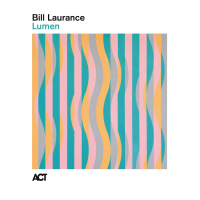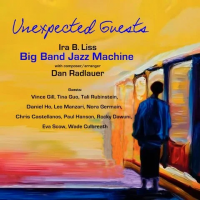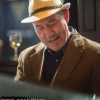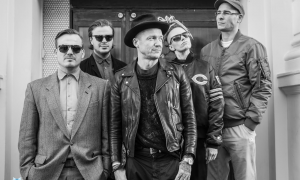Home » Jazz Articles » Live Review » Stella Heath Sextet at Joe Henderson Lab
Stella Heath Sextet at Joe Henderson Lab
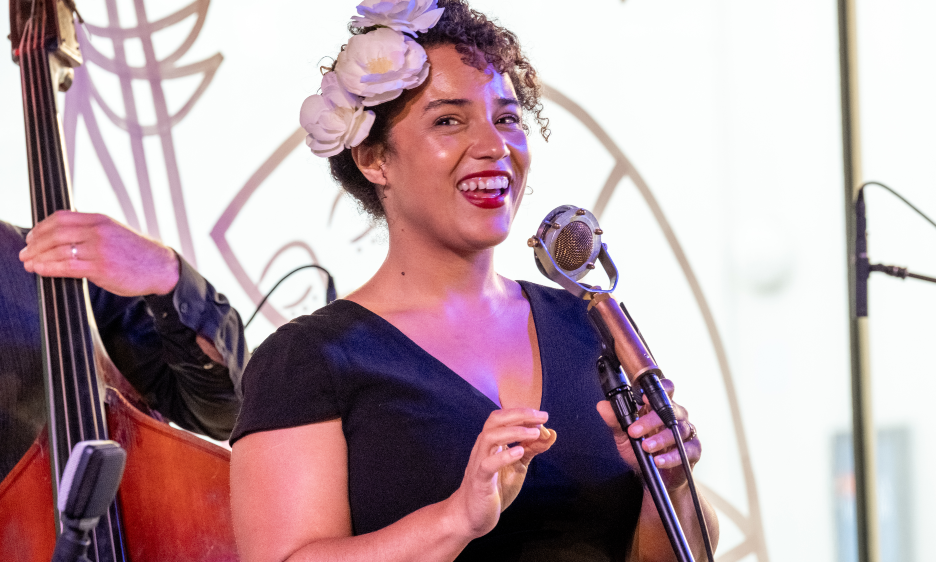
Courtesy Steve Roby
Billie Holiday’s decision to sing 'Strange Fruit' was significant, and it remains a powerful song that still needs to be sung.
—Stella Heath
Joe Henderson Lab
Tribute To Billie Holiday
San Francisco, CA
September 7, 2025
The Joe Henderson Lab was full, the kind of sold-out where strangers sit shoulder to shoulder and the air sharpens with anticipation. It carried a small-room charge—as if we'd all agreed to listen harder. An hour is not a long time, yet this set unfolded like a compact short story: precise scenes, careful silences, a closing image that refuses to leave. Stella Heath entered in period dress, with white gardenias in her hair, an emblem and a promise, and her sextet matched the era with crisp, 1930s—40s attire. The message was not costume drama. It was witness. Heath's Billie Holiday Project aims to tell the truth about the songs and about the life that shaped them—history delivered without fuss, and music that lets the history speak back.
What keeps the evening honest is Heath's refusal to impersonate. Holiday's phrasing is a language, not a magic trick, and Heath treats it that way—borrowing a turn of inflection when it clarifies meaning, keeping her own tone when that is truer to the line. She lands behind the beat with deliberation, never slack, and allows a phrase to fall where it can do the most work. That discipline—homage without mimicry—does more than flatter Lady Day; it honors her as an artist who chose, measure by measure, how to tell her stories.
The band makes those choices audible. Neil Angelo Fontano's piano introduces and releases scenes with the tact of a seasoned stage manager—two bars to settle us, a reharmonized cadence to open a door. Robbie Elfman moves between clarinet and saxophone like a witness adjusting his testimony, sometimes curling under a syllable, sometimes cutting through it so the lyric can breathe. Daniel Fabricant's bass and Spike Klein's drums keep the ground gently in motion, a swing that invites those late vocal entrances without losing momentum. Ian Scherer 's guitar paints in the margins, and Justin Au's trumpet offers bright, unsentimental testimony—well-placed exclamation points rather than grandstanding.
The opening selections honor Holiday's early stride into the public ear—"Your Mother's Son In Law" and "If You Were Mine"—material too often treated as quaint. Heath treats them as lightly coded declarations of self. Holiday was barely out of her teens when she began making records. Yet, the knowingness was already there, and Heath understands that the thrill is not novelty, but agency: a young singer deciding what the song will and will not say about her. "God Bless the Child" arrives with a story, as it should. Heath reminds the room of the quarrel that sparked the title and the stubbornness that turned it into art. Her reading makes the refrain less sermon than benediction; Elfman answers with a clarinet line that sounds like memory turning a corner. Nothing inflated, nothing ornamental. The weight lies in the lyric, and the band gives it the space to settle.
One of the evening's small triumphs is a contemporary piece that belongs in this company: Villray's "These Tears (are all I have of you)." Heath explains why it sits so naturally beside the 1930s material: the economy of the lyric, the unforced melody, the absence of self-congratulation. It's a bridge to the present that doesn't collapse the past. She sings it with the same candor she brings to the standards, which is the point—vintage isn't the virtue; emotional accuracy is. Heath also keeps the Bay Area's own Billie Holiday stories alive. She nods to the Fillmore's archival book, Harlem of the West, to a time when a revoked New York cabaret card pushed Holiday westward and San Francisco became both refuge and stage. In a city swift to reinvent itself, the reminder lands. You could feel the room lean in, not out of nostalgia, but out of civic memory.
"Speak Low" shifts the light. The band traces the tune's subtle Latin undercurrent—brushes whispering, bass walking with a dancer's caution, guitar sketching soft latticework—while Heath glides just behind the pulse, testing the seam between longing and control. Then comes "Swing Brother Swing," a lively arrow back to the Savoy Ballroom, to the democratic test of whether you could make bodies move. Elfman roars on tenor; Au answers with a bright retort, and for a few bars, the Lab feels like a dance floor with seating.
Because this is the Joe Henderson Lab—intimate, acoustically candid—Heath often plants the lyric "right in the listener's ear." The narration is a backstage pass, never a lecture, and always in service of the next phrase. You sense the show can flex night to night, but its spine is steady: context first, then performance, then the felt afterlife of each number in the quick hush that follows.
"Autumn in New York" is delivered not as postcard romance but as lived city: bus-stop melancholy, light on wet pavement, the private bargains every season asks of us. Fontano's closing cadence feels earned, not arranged. The small cheer that greets the title is recognition rather than nostalgia.
And then "Strange Fruit." There is no safe way to sing it, and Heath does not try. She frames the piece with what must be remembered: Abel Meeropol's poem, the Village conversation that brought it to Holiday, the hesitation and the decision, and the years of attention from authorities who preferred she stop. In 1939, when racial terror was not a metaphor but a practice, Holiday chose to perform the song night after night. That choice helped mark her as a grandmother of the Civil Rights Movement. Heath keeps the arrangement spare—heartbeat drums, a sotto voce horn, the piano an austere witness. She lets the imagery do its unsoftened work—the air changes. The ending is earned not by volume but by moral clarity, and when the last tone fades, the silence feels like part of the composition.
Holiday understood song as civic speech. She used the stage to say what a democracy needed to hear, long before it was common, or safe, to do so. The singers who take up her repertoire today aren't borrowing martyrdom; they are practicing the same freedom: the right to tell the truth with craft and without apology. That is what made this one-hour, sold-out evening unforgettable. Heath and her colleagues dress the part not to play museum but to remind us that we have walked this road before. The gardenia is not decoration; it's a pledge. In the intimacy of the Lab, the pledge holds. Audience and band keep that quiet contract we made at the top—to listen harder—and the music answers with honesty.
This was not a séance and not a pageant. It was a compact between artists and listeners. The songs stood as lived testimony; the room carried them forward. In an era when suspicion is cheap and attention is rarer than ever, the Stella Heath Sextet made space for both courage and care, and for Billie Holiday's insistence that art can be a form of freedom.
Setlist
"Your Mother's Son In Law," "If You Were Mine," "God Bless The Child," "These Tears (are all I have of you)," "Speak Low," "Swing Brother Swing," "Autumn in New York," and "Strange Fruit."Tags
Live Review
Stella Heath
Steven Roby
United States
California
san francisco
Billie Holiday
Neil Angelo Fontano
Robbie Elfman
Daniel Fabricant
Spike Klein
Ian Scherer
Justin Au
PREVIOUS / NEXT
Support All About Jazz
 All About Jazz has been a pillar of jazz since 1995, championing it as an art form and, more importantly, supporting the musicians who make it. Our enduring commitment has made "AAJ" one of the most culturally important websites of its kind, read by hundreds of thousands of fans, musicians and industry figures every month.
All About Jazz has been a pillar of jazz since 1995, championing it as an art form and, more importantly, supporting the musicians who make it. Our enduring commitment has made "AAJ" one of the most culturally important websites of its kind, read by hundreds of thousands of fans, musicians and industry figures every month.



